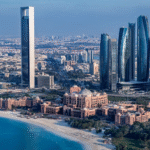Now Reading: UAE Real Estate: 6 New Regulations Impacting Off-Plan Projects in 2025
-
01
UAE Real Estate: 6 New Regulations Impacting Off-Plan Projects in 2025
UAE Real Estate: 6 New Regulations Impacting Off-Plan Projects in 2025

Table of Contents
The UAE real estate market, with AED 893 billion ($243.1 billion) in transactions across 331,300 deals in 2024, remains a global investment hub, with off-plan properties driving 63% of Dubai’s sales, per gulfnews.com.
In 2025, new regulations enhance transparency, investor protection, and sustainability for off-plan projects, aligning with the UAE’s Vision 2030 and a projected 5-8% price growth, per colife.ae.
These rules, enforced by the Dubai Land Department (DLD), Real Estate Regulatory Agency (RERA), and Abu Dhabi’s Department of Municipalities and Transport (DMT), address risks like delays and cancellations while supporting a 6.2% GDP growth forecast, per damacproperties.com.
Below are six key regulations impacting off-plan projects in 2025, their implications, and actionable steps for compliance.
1. Enhanced Escrow Account Oversight
Description: Dubai Law No. 8 of 2007, amended in 2025, mandates stricter escrow account management for off-plan projects. Developers must deposit all buyer payments into DLD-supervised escrow accounts, with funds released only upon verified construction milestones (e.g., 20% at foundation completion), per hausandhaus.com. Abu Dhabi’s Law No. 2 of 2025 extends similar requirements, per lexology.com.
Implications: Reduces risk of fund misuse, ensuring 90% of projects meet deadlines, per gulfbusiness.com. Buyers face lower financial risk but may encounter stricter payment schedules. Non-compliant developers risk fines up to AED 500,000.
Action: Verify escrow account details with DLD or DMT, confirm developer compliance via RERA’s portal, and retain payment receipts for audits.
2. Mandatory Sustainability Standards
Description: The UAE’s National Green Certificates Program, expanded in 2025, requires off-plan projects to meet energy efficiency and sustainability standards (e.g., solar panels, low-flow fixtures saving 15-20% on energy/water). Dubai and Abu Dhabi mandate Estidama Pearl or UAE Green Building certification, per veersant.com.
Implications: Increases construction costs by 5-10% but boosts property value by 8-12% due to eco-conscious buyer demand, per retyn.ai. Non-compliant projects face permit denials. Investors benefit from 10% higher occupancy rates in green properties.
Action: Confirm developer’s green certification with DLD or DMT, verify sustainability features in project plans, and retain documentation for tax benefits (e.g., 5% VAT recovery on eco-friendly fittings).
3. Expanded Foreign Ownership Zones
Description: Dubai’s 2025 regulations, under DLD’s Real Estate Tokenisation Project, expand freehold zones for foreign buyers, simplifying documentation and digitizing registration, per hausandhaus.com. Abu Dhabi’s Law No. 2 of 2025 broadens freehold areas like Al Reem Island, per lexology.com. Foreigners can own off-plan properties outright in designated zones.
Implications: Increases foreign investment by 15%, especially in projects like Dubai Creek Harbour (apartments from AED 1.45 million, $394,800), with 8-12% capital gains by 2026, per gulfbusiness.com. Streamlined processes reduce transaction times by 20%.
Action: Verify freehold status with DLD or DMT, use DLD-registered brokers, and file IRS Form 1118 for U.S.-UAE DTA tax credits to preserve 10-15% returns.
4. Stricter AML/KYC Compliance
Description: Under the UAE Central Bank’s AML & CFT Regulations 2024, extended into 2025, off-plan transactions above AED 5 million require enhanced AML/KYC checks. Virtual asset transactions (e.g., cryptocurrency) must use licensed providers, per gtlaw.com. Developers and brokers face mandatory reporting of suspicious activities.
Implications: Increases compliance costs by 2-3% but enhances market integrity, attracting 20% more institutional investors, per gtlaw.com. Non-compliance risks penalties up to AED 1 million or project suspension. Delays high-value transactions by 5-10 days.
Action: Provide detailed KYC documentation (e.g., passport, source of funds), verify broker licensing with DLD, and ensure virtual asset transactions comply with Central Bank rules.
5. Strengthened Refund Mechanisms for Cancellations
Description: Dubai’s Decree No. 33 of 2020, updated in 2025, governs cancellations of off-plan projects. Buyers can file grievances with the Judicial Committee for Unfinished and Cancelled Projects, ensuring full refunds from escrow accounts within 60 days, per capriuae.com. Abu Dhabi’s Law No. 2 of 2025 aligns with similar protections, per lexology.com.
Implications: Protects 100% of buyer investments in cancelled projects, boosting confidence. Refunds reduce financial loss but may delay reinvestment. Developers face stricter scrutiny, with 95% of projects now escrow-compliant, per gulfnews.com.
Action: File grievances with DLD’s Judicial Committee if projects are delayed or cancelled, verify escrow account status, and retain purchase agreements for legal recourse.
6. Flexible Payment Plan Regulations
Description: In 2025, 40% of off-plan projects in Dubai and Abu Dhabi must offer flexible payment plans (e.g., 10% down, 50/50 or 60/40 schedules), per veersant.com. Developers must register plans with DLD or DMT, ensuring transparency and milestone-based disbursements, per exclusive-links.com.
Implications: Lowers entry barriers, increasing buyer participation by 25%, especially for first-time investors in areas like JVC (apartments from AED 550,000, $149,700), per bayut.com. Yields remain 6-8% with 5-8% capital gains by 2026. Non-compliant developers face permit revocations.
Action: Review payment plans with DLD or DMT, confirm developer’s financial health via RERA’s portal, and use DLD-registered brokers to secure favorable terms.
Why These Regulations Matter
These regulations align with the UAE’s 5-7% GDP contribution from real estate, a 5% population growth, and a tourism target of 20 million visitors by 2027, per deloitte.com. Off-plan projects, like Dubai Creek Harbour and Saadiyat Island, offer 6-11% yields and 8-12% capital gains, per properties.emaar.com.
Enhanced escrow and refund mechanisms reduce risks of delays (affecting 10% of projects in 2024), while sustainability and AML rules attract eco-conscious and institutional investors, per gtlaw.com.
Posts on X highlight investor confidence in DLD’s mediation and refund processes, per @jobxdubai. Challenges include rising construction costs (10% in 2024) and potential oversupply (182,000 units by 2026), per gulfnews.com.
Tax Tools for American Investors
U.S.-UAE DTA: Credit UAE taxes via IRS Form 1118, preserving 10-15% returns.
Zakat for Muslim Investors: Pay 2.5% Zakat on rental income (e.g., AED 2,000 on AED 80,000). Consult Islamic scholars.
VAT Recovery: Recover 5% input VAT on construction/furnishings (e.g., AED 25,000 on AED 500,000) for VAT-registered investors.
Market Outlook and Challenges
The UAE off-plan market forecasts 5-8% price growth and 5-11% yields in 2025, driven by infrastructure like Al Maktoum Airport and tourism growth, per colife.ae. Risks include delays (mitigated by escrow rules) and global economic pressures (e.g., U.S. tariffs), per agbi.com. Non-compliance with DLD or DMT risks penalties up to AED 500,000 or project cancellation, per hausandhaus.com.
Conclusion
The 2025 regulations—enhanced escrow oversight, mandatory sustainability, expanded freehold zones, stricter AML/KYC, robust refund mechanisms, and flexible payment plans—strengthen the UAE’s off-plan market. Projects like Dubai Creek Harbour, Saadiyat Lagoons, and Sobha Siniya Island benefit from these rules, offering 5-11% yields and 5-12% capital gains.
Compliance with DLD, RERA, and DMT, alongside diligent research, ensures secure and profitable investments in this dynamic market. UAE off-plan
read more: UAE Property Investment: 7 Areas Projected for High Growth in 2025






















